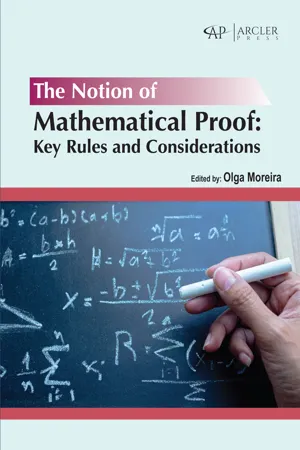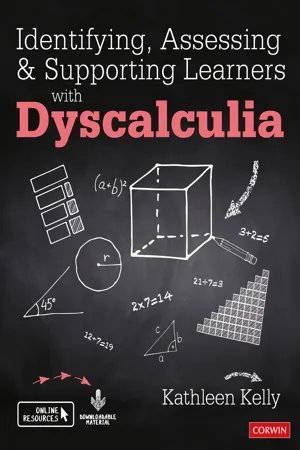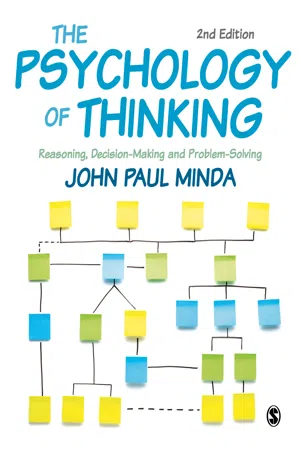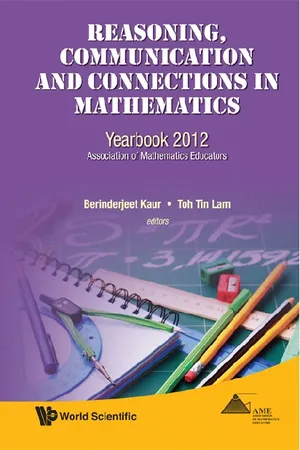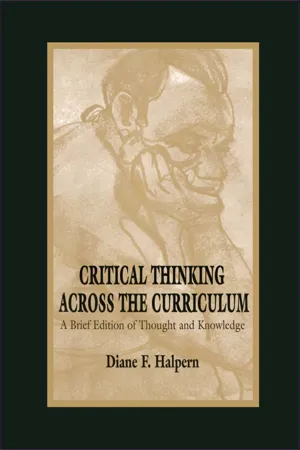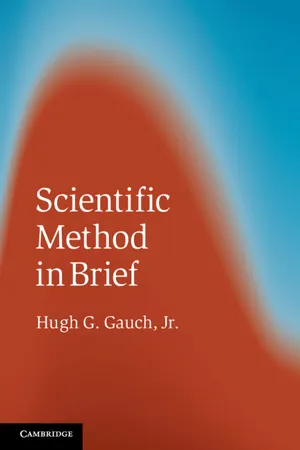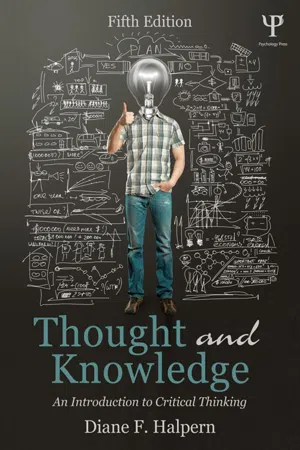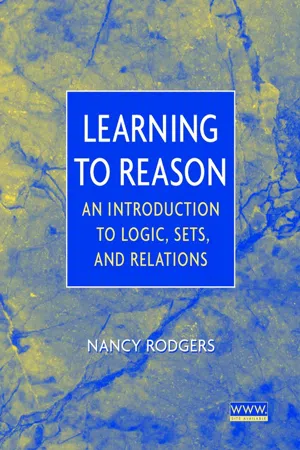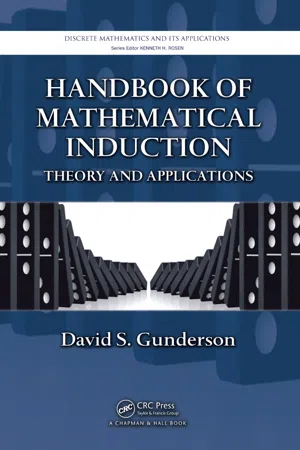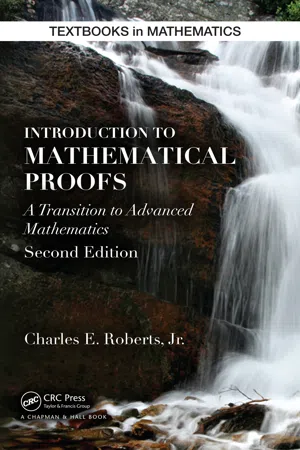Mathematics
Deductive Reasoning
Deductive reasoning in mathematics involves drawing specific conclusions from general principles or premises. It follows a top-down approach, starting with a general theory and applying it to specific cases to reach a logical conclusion. This method is fundamental to mathematical proofs and problem-solving, providing a systematic way to establish the truth of mathematical statements.
Written by Perlego with AI-assistance
Related key terms
1 of 5
12 Key excerpts on "Deductive Reasoning"
- Olga Moreira(Author)
- 2023(Publication Date)
- Arcler Press(Publisher)
There are two universally recognized proving methods namely deduction and induction (Kögce et al., 2010; Miyazaki, 2000). Deduction method of proof involves several methods encompassing direct proof, proof by contraposition, and proof by contradiction (Baki, 2008; Moralı et al., 2006). Deduction method in mathematics begins with a general statement or hypothesis and examines the possibilities to reach a specific logical conclusion (Morris, 2002). Induction method is generally used by 8th grade students or secondary school students because they have already learned to prove numerical or geometrical proposition (Miyazaki, 2000). These two methods are based on the types of reasoning used by someone in carrying out a proving process, of which each respectively refers to Deductive Reasoning and inductive reasoning. Deductive Reasoning is unique because it is a process of deducing conclusions from known information (premise) based on formal logic rules, where the conclusions must come from information provided and do not need to validate them with experiments (Ayalon & Even, 2008). Whereas, Christou and Papageorgiou (2007) conveyed that inductive reasoning is a reasoning process from specific premises or observations to reach a general conclusion or an overall rule. Of those two, Deductive Reasoning, which is used in a deductive proof, is considered the preferred tool in many mathematical communities to verify mathematical statements and demonstrate universality. Therefore, Ayalon and Even (2008) argued that Deductive Reasoning is often used as a synonym for mathematical thinking. Deductive or Inductive? Prospective Teachers’ Preference of Proof ... 171 Knowledge of mathematical proof is considered as one essential component of subject matters (Shulman, 1986) in which mathematics teachers must acquire. Jones (1997) argued that teachers will have an extremely secured subject knowledge base of mathematical proof if they teach it accurately and confidently.- Kathleen Kelly(Author)
- 2020(Publication Date)
- Corwin UK(Publisher)
While it is generally agreed that Deductive Reasoning is essential in mathematics, not everyone conceptualises it in the same way. Ayalon and Even (2008) interviewed 21 individuals from the field of mathematics (secondary school teachers, researchers in mathematics and lecturers of undergraduate and postgraduate mathematics students) using semi-structured interviews that lasted between one and two hours to find out how they defined Deductive Reasoning. They identified two different conceptualisations. Four individuals described Deductive Reasoning as a systematic step-by step manner of solving problems and linked it also to activities outside mathematics (but made no mention of logic). The other 17 people interviewed emphasised logic and inference. They described it as logical thinking which examined the validity of arguments.Similarly, differences can be found in the literature in the way that Deductive Reasoning is explained. Some associate it mainly with geometry (e.g. Jupri, 2017; Llinares and Clemente, 2019), others with understanding number relationships (e.g. Morsanyi and Szucs, 2015) or algebraic proofs (e.g. Martinez and Pedemonte, 2014), and in some cases non-mathematics-related subjects such as story comprehension (Schwartz et al., 2018). The type of Deductive Reasoning used often depends on the particular activity the learner is engaged in. Three main forms of Deductive Reasoning are reported in the literature: reasoning used in reaching conclusions from a given stimulus (e.g. Barkl et al., 2012; Murawska and Zollman, 2015), in forming hypotheses to develop proofs (e.g. Miyazaki et al., 2017) and in transitive inference used in deriving a relationship (e.g. Morsanyi and Szucs, 2015; Schwartz et al., 2018). These three types of Deductive Reasoning are discussed below.Reasoning from the General to the Specific
Murawska and Zollman (2015) describe Deductive Reasoning as a process which involves reasoning from premises that are generally accepted as true to reach specific conclusions. For example:- All triangles have three sides. This shape has three sides therefore it must be a triangle.
- An obtuse angle is one that is more than 90 degrees. This angle is 120 degrees therefore it is an obtuse angle.
- Parallel lines are an equal distance apart. These lines are an equal distance of 5cms apart so they must be parallel lines.
- All numbers ending is 0 or 5 are divisible by 5. The number 20 ends in 0 so it must be divisible by 5.
- A proper fraction is less than one. The fraction
- eBook - ePub
- W. James Potter(Author)
- 2019(Publication Date)
- SAGE Publications, Inc(Publisher)
Chapter 7 Deducing: Reasoning with Logic from General Principles- I. The Deduction Algorithm
- Step 1: Begin With an Observation
- Step 2: Identify a Relevant General Principle
- Step 3: Use the Two Premises to Reason Logically to a Conclusion
- II. Heuristics
- Heuristic 1: Probability Premise
- Heuristic 2: Conditional Reasoning
- III. Avoiding Traps
- Trap 1: Faulty Major Premise
- Trap 2: Irrelevant Major Premise
- Trap 3: Too Complex a Major Premise Is Needed
- Trap 4: Conditional Reasoning
- Trap 5: Irrational Reasoning
- Trap 6: Unwillingness to Build Knowledge Structures
- IV. Chapter Review
- Exercises
Deduction is the skill of using a few premises to reason logically toward a conclusion. The basic procedure of deduction follows a reasoning process in the form of a syllogism, which is a set of three statements. The first statement in the set is called the major premise ; it is usually a general principle or rule. The second statement is called the minor premise ; it is usually an observation. The third statement is the reasoned conclusion . We use logic to see if the observation fits the rule and then derive the conclusion.Perhaps the most familiar example of a syllogism is the one that uses the following two premises: (1) All men are mortal and (2) Socrates is a man. From this we can conclude that Socrates is mortal. The first premise is the major one; that is, it states a general proposition. The second premise is the minor one; that is, it provides information about something specific (in this case, a specific person) in a way that relates it to the major premise. Using logic, we see that the observation in the second premise fits the rule in the first premise and we conclude that Socrates is mortal.Deduction is the skill that the fictional detective Sherlock Holmes employed so successfully to make sense of clues and solve crimes. He knew a great deal about the physical world and about human behavior; this knowledge was his bank of major premises. He had keen powers of observation, so he was able to recognize clues that were the most relevant to solving a crime; his observations were his minor premises. When Sherlock Holmes found a clue (such as a scratch on a walking cane, mud on someone’s shoes, or the gardener taking walks in the middle of the night), he had a minor premise (the second statement in his syllogisms). He then searched his knowledge bank for a relevant general principle that could be used to explain the minor premise; this general principle became his major premise (the first statement in his syllogisms). He then used the general principle to explain the clue and this produced a conclusion. To Sherlock Holmes, this process of logical reasoning uses syllogisms. To us readers, he appeared to be a genius in his crime-solving ability but as he often said, “It’s elementary!” meaning that this was simple to him. And yes, the process of logical reasoning with a syllogism was easy for Sherlock Holmes; what was difficult was acquiring all the general principles and making good observations. - eBook - ePub
The Psychology of Thinking
Reasoning, Decision-Making and Problem-Solving
- John Paul Minda(Author)
- 2020(Publication Date)
- SAGE Publications(Publisher)
The previous chapter discussed inductive reasoning. Induction involves making predictive inferences from observations. Induction moves from specific to general (based on evidence) and drawing conclusions that are likely to be true. In induction, the outcomes are probabilistic. For that reason, many of the examples in the literature were framed as statements of confidence in a prediction or a generalization. Induction can also be described as going beyond the given evidence to discover something new via thinking. With deductive logic, on the other hand, we are attempting to explain how people make specific conclusions and to determine if that conclusion is valid. Deduction often starts with a general statement (“My jacket is either in my backpack or at school”), and then proceeds to more specific statements (“It's not in my backpack”). Rather than going beyond the given evidence to discover something new via thinking, deduction often involves verifying that which is already known.The two kinds of reasoning are related in terms of how we use them in everyday thinking. Although the psychology of induction and deduction differ, we tend to use them together and it can be difficult to tell if you are using inductive reasoning or Deductive Reasoning. For example, if I buy a coffee from McDonald's, take a sip, and discover that it is very hot, I conclude that McDonald's coffee is very hot. That is a generalization, and I can infer that other McDonald's will serve hot coffee. Categorical induction might even allow me to project the property of “hot” to coffee purchased at other, similar restaurants. In both cases, I am relying on inductive reasoning and past experience to make some conclusions about the future.Suppose, then, that I form a general premise about McDonald's coffee. This premise can be stated as:Premise: McDonald's coffee is hot.A premise is a statement of facts about something. In this case, it's a statement of fact about McDonald's coffee. A premise like this can be used to make precise conclusions. For example, combined with additional premises and a conclusion , we can create an entire categorical syllogism - eBook - PDF
Reasoning, Communication And Connections In Mathematics: Yearbook 2012, Association Of Mathematics Educators
Yearbook 2012, Association of Mathematics Educators
- Berinderjeet Kaur, Tin Lam Toh(Authors)
- 2012(Publication Date)
- World Scientific(Publisher)
But mathematics is a deductive science and cannot accept inductive reasoning as a valid form of proof. Moreover in everyday reasoning, if there are reasonable-enough justifications from past experiences, a conjecture is often accepted as truth. This is contrary to providing a mathematical proof where a conjecture is not considered to have the same rigour of truth as a proven theorem. Ernest (1984) suggested that the prevalence of the inductive proof scheme could be due to the confusion over the name induction. Ernest also suggested that it is important for teachers to carefully highlight the distinction between heuristic inductive reasoning and the proof by mathematical induction as a rigorous deductive proof. He further suggested that to distinguish the two, the heuristic inductive reasoning be called by some other name like method of generalisation other than induction. This may not be a problem in Singapore, because students are not told that the heuristic inductive reasoning method is also known as induction. So when Junior College students mention the word “induction” it is commonly taken by the teachers and students to refer to mathematical induction. It is more likely that the exhibition of the inductive proof scheme by students here is due to their misconception that the generalisation from patterns constitutes a valid justification. This, as mentioned, may be a carry-over Students’ Reasoning Errors in Writing Proof 231 effect from everyday reasoning, or could be due to their prior experience with questions that require students to deduce an answer from patterns, which they have encountered in secondary schools. JT is one student who had accepted the inductive proof scheme as a valid proof because of his prior experiences in secondary school. I showed JT Figure 2 and asked, I: Is this justifiable? Does this prove? JT: Hmm… It is logical. - eBook - ePub
Critical Thinking Across the Curriculum
A Brief Edition of Thought & Knowledge
- Diane F. Halpern(Author)
- 2014(Publication Date)
- Routledge(Publisher)
This conclusion follows logically from the earlier statement. If we know that it is true that everyone has only one head, then it must also be true that any specific person will have only one head. This conclusion necessarily follows from the belief; if the belief is true, the conclusion must be true. Deductive Reasoning is sometimes described as reasoning “down” from beliefs about the nature of the world to particular instances. Rips (1988) argued that deduction is a general-purpose mechanism for cognitive tasks. According to Rips, deduction “enables us to answer questions from information stored in memory, to plan actions according to goals, and to solve certain kinds of puzzles” (p. 117). The notion of reasoning up from observations and reasoning down from hypotheses is schematically shown in Fig. 4.1. Although it is common to make a distinction between inductive and Deductive Reasoning (Neubert & Binko, 1992), the distinction may not be a particularly useful description of how people reason in real life. In everyday contexts, we switch from inductive to Deductive Reasoning in the course of thinking. Our hypotheses and beliefs guide the observations we make, whereas our observations, in turn, modify our hypotheses and beliefs. Often, this process will involve a continuous interplay of inductive and Deductive Reasoning. Thinking in real-world contexts almost always involves the use of multiple types of thinking skills. FIG. 4.1 A pictorial distinction between deductive and inductive reasoning. In most real-world settings, we use both types of reasoning recursively LINEAR ORDERING Reasoning is simply a matter of getting your facts straight. —B. F. Anderson (1980, p. 62) Joel is stronger than Bill, but not as strong as Richard. Richard is stronger than Joel, but not as strong as Donald. Who is strongest and who is second strongest? Although I'm sure that you've never met Joel, Donald, Richard, and Bill, I'm also sure you could answer this question - eBook - PDF
- Hugh G. Gauch, Jr(Authors)
- 2012(Publication Date)
- Cambridge University Press(Publisher)
But inductive arguments admit of degrees of strength. One inductive argument might support its conclusion with a very high probability, whereas another might be rather weak. The contrast between deduction’s certainties and induction’s probabilities can easily be overdrawn, however, as if to imply that induction is second-rate logic compared with deduction. Representing certain truth by a probability of 1 and certain falsehood by 0, an inductive conclusion can have any probability from 0 to 1, including values arbitrarily close to 1 representing certainty of truth (or 0 representing certainty of falsehood). Given abundant evidence, induction can deliver practical certainties, although it cannot deliver absolute certainties. Third and finally, deduction typically reasons from the general to the spe- cific, whereas induction reasons in the opposite direction, from specific cases to general conclusions. That distinction was prominent in Aristotle’s view of sci- entific method (Losee 2001:5–8) and remains prominent in today’s dictionary definitions. For instance, the Oxford English Dictionary defines “deduction” as “inference by reasoning from generals to particulars,” and it defines “induction” as “The process of inferring a general law or principle from the observation of particular instances.” Deduction reasons from a given model to expected data, whereas induction reasons from actual data to an inferred model, as depicted in Figure 7.1. As encountered in typical scientific reasoning, the “generals” and “partic- ulars” of deduction and induction have different natures and locations. The general models or theories exist in a scientist’s mind, whereas the particular instances pertain to physical objects or events that have been observed. Often, Historical perspective on deduction 115 Deduction and Induction Given Model Inferred Model Expected Data Deduction Induction Actual Data Figure 7.1 The opposite reasoning directions of deduction and induction. - eBook - ePub
Thought and Knowledge
An Introduction to Critical Thinking
- Diane F. Halpern(Author)
- 2013(Publication Date)
- Psychology Press(Publisher)
ecological validity of syllogisms. Ecological validity concerns the real world validity or applications of a concept outside of the laboratory or classroom. In other words, do people use syllogistic reasoning in real-world contexts? When the premises are not meaningful or useful (e.g., “some lawyers are rich”), it is easy to see why so many people believe that learning the skills of Deductive Reasoning is also not meaningful or useful. Many people have argued that it is irrelevant to how we think in our everyday lives (Evans & Elqayam, 2011) and that “few problems of consequence in our lives have deductive or even any meaningful kind of ‘correct’ solution” (Sternberg, 2011, p. 270). I think it is more accurate to conclude that they are of some, but limited, usefulness. There are many areas where they are important, such as making a diagnosis or solving a mathematical problem or deciding if a particular legal conclusion is valid given an existing law. There are many more situations in which the correct conclusion depends on probabilities and whether a particular source of information is credible. Anyone solving mathematical proofs or other problems that are in the form of syllogisms will need to know how to determine deductive validity.Calvin and Hobbes by Bill Watterson. Used with permission by Universal Press Syndicate.Syllogistic reasoning and the other types of reasoning like linear ordering and “if, then” statements are sometimes considered as a subset of problem solving. Often, when solving a problem, we begin with statements that we believe or know to be true (the premises) and then decide which conclusions we can logically infer from them. Syllogisms also appear implicitly in normal English prose. Of course, in natural context, the premises and conclusions are not labeled, but the underlying structure is much the same. They are especially easy to spot in legal and political arguments and thus often appear on standardized tests for college, graduate, and law school admissions.Here is an example of syllogistic reasoning that may seem more like the kind of syllogism you would find in everyday contexts: The death sentence should be declared unconstitutional. It is the cruelest form of punishment that is possible, and it is also very unusual. The constitution specifically protects us against cruel and unusual punishment.Can you conclude from these statements that the death sentence is unconstitutional? Try to formulate these sentences into standard syllogism form (two premises and a conclusion). Use circle diagrams or the seven rules to check on the validity of the conclusion. Stop now and work on this natural language syllogism. - eBook - PDF
Learning to Reason
An Introduction to Logic, Sets, and Relations
- Nancy Rodgers(Author)
- 2011(Publication Date)
- Wiley-Interscience(Publisher)
So p(2) is true. Conclusion Therefore, by mathematical induction, p(n) is true for all positive integers n where n>2. Deductive Reasoning Mathematical induction is a type of Deductive Reasoning, even though its name sounds more like inductive reasoning. Inductive reasoning is when we suspect that something is true based on examples, experiments, or experiences. Before we prove a statement by mathematical induction, we normally verify it for various values of n, which may be the reason that Augustus De Morgan gave it the name of mathematical 186 Chapter 2 Writing Our Reasoning induction back in 1838. However, inductive reasoning pro-vides no guarantee that our conjecture is true. On the other hand, a proof by mathematical induction does provide a 100% guarantee that the sentence is true for the specified integers. Deductive and inductive reasoning each have an important function in the reasoning process, but the proof method of mathematical induction is in the camp of Deductive Reasoning, not inductive reasoning. Exercise Set 2.7 1. Consider the following formula. 2 + 4 + 6 + ... + 2n = n(n+l) a. Check to see if the formula works for various values of n. b. If your examples indicate that the formula is correct, try to use mathematical induction to prove that the formula is true for every positive integer n. State what p(ri) represents in your proof, state the conclusion for the first part of the proof, and also state the final conclusion. c. Let Si denote the ith term in the sum: 2 + 4 + 6 + ... + 2и Give a formula for st n d. Rewrite the sum in part (c) in summation notation: E s 2. In the adjacent square, we have a picture of 1+3+5+7. o o o o a. Expand this sketch to get a picture of 1+3+5+7+9. o o o | o b. Use visual reasoning to conjecture a formula for the sum of the first n odd positive integers. c. Translate the sum of the first n odd positive integers into the following form: 1 + 3+5+... - eBook - PDF
Handbook of Mathematical Induction
Theory and Applications
- David S. Gunderson(Author)
- 2014(Publication Date)
- Chapman and Hall/CRC(Publisher)
Part I Theory This page intentionally left blank This page intentionally left blank Chapter 1 What is mathematical induction? Induction makes you feel guilty for getting something out of nothing, and it is artificial, but it is one of the greatest ideas of civilization . —Herbert S. Wilf, MAA address, Baltimore, 10 Jan. 1998. 1.1 Introduction In the sciences and in philosophy, essentially two types of inference are used, deduc-tive and inductive. Deductive inference is usually based on the strict rules of logic and in most settings, deductive logic is irrefutable. Inductive reasoning is the act of guessing a pattern or rule or predicting future behavior based on past experience. For example, for the average person, the sun has risen every day of that person’s life; it might seem safe to then conclude that the sun will rise again tomorrow. However, one can not prove beyond a shadow of a doubt that the sun will rise tomorrow. There may be a certain set of circumstances that prevent the sun rising tomorrow. Guessing a larger pattern based upon smaller patterns in observations is called empirical induction . (See Chapter 6 for more on empirical induction.) Proving that the larger pattern always holds is another matter. For example, after a number of experiments with force, one might conclude that Newton’s second “law” of motion f = ma holds; nobody actually proved that f = ma always holds, and in fact, this “law” has recently been shown to be flawed (see nearly any modern text in physics, e.g. , [56, p.76]). Another type of induction is more reliable: Mathematical induction is a form of reasoning that proves , without a doubt, some particular rule or pattern, usually infinite. The process of mathematical induction uses two steps. The first step is the “base step”: some simple cases are established. The second step is called 1 - eBook - PDF
- Charles Roberts(Author)
- 2014(Publication Date)
- Chapman and Hall/CRC(Publisher)
Chapter 2 Deductive Mathematical Systems and Proofs This chapter is devoted to the study of deductive mathematical systems and elementary proof techniques. In Section 2.1, we define deductive mathe-matical systems and discuss the Euclidean and non-Euclidean geometries, the system of natural numbers, and the system of integers. In Section 2.2, basic techniques for proving conditional statements such as direct proof, proof by contraposition, proof by contradiction, and proof by cases are presented. We also discuss proving biconditional statements, proving a statement by contra-diction, and proving statements which contain quantifiers. Next, we present some well-known mathematical conjectures and show how to prove and dis-prove conjectures. And finally, we define and examine the system of rational numbers and the system of real numbers. 2.1 Deductive Mathematical Systems A deductive mathematical system (an axiomatic theory) consists of the following six elements: 1. An underlying language—English, in our case. 2. A deductive logic system—which we introduced in Chapter 1. 3. A list of undefined terms. 4. A list of formally defined technical terms, called definitions. 5. A list of statements which are assumed to be true, called postulates or axioms. 6. A list of deduced statements, called theorems. If, on one of the first days of class, we were to ask beginning geometry stu-dents the definition of a “point,” we would receive several responses. Among those responses we would most likely find: “A point is the intersection of two lines.” If a little later in the class, we ask the same students to define a “line,” we would probably receive one or both of these responses: “A line is the shortest distance between two points.” “A line is determined by two 61 - eBook - PDF
Evidence and Proof in Scotland
Context and Critique
- Donald Nicolson(Author)
- 2019(Publication Date)
- Edinburgh University Press(Publisher)
The Psychological Context II 311 proved). Moreover, evidence analysts tend not to refer to facts, but to propo-sitions of fact – namely statements of facts which can be declared to be true or false, proven or unproven, likely or unlikely, etc. What transforms a factum probans into a proven fact is an inference made using inductive reasoning in the Wigmorean sense. 79 Thus, instead of starting with a major premise which is applied to facts to reach a conclu-sion, the fact finder infers one fact from another by relying on an implicit or hidden generalisation. Of course, one can always – and, as we shall see, usefully – translate such inductive reasoning into Deductive Reasoning, by making explicit the generalisation relied upon and using it as the major premise of the deductive syllogism. But practically speaking it would be incredibly laborious and tedious, not to say awkward, to do so when pre-senting facts. Nor is it likely to reflect how people evaluate facts during fast-moving fact-finding episodes. Reasoning about facts is also inductive in the more usual, non-Wigmorean sense 80 in that it involves premises which are – at best – only probably true. Even when major premises which are infallibly true are relevant to reasoning about evidence, they will usually either be so obvious as to be of little practical use or their application will be subject to doubt because of potential additional information (called additional antecedents) which can suppress the deductive inference (through what is known as default or nonmonotonic reasoning). 81 For instance, if an object is thrown off a roof, we can infer that it will hit the ground unless something intervenes. But if we see it hit the ground, we need only make basic inferences about our perceptive capacities. On the other hand, if our view is obscured, we can only predict that the object is very likely to hit the ground and we are back to using a premise couched in probabilities and not certainties.
Index pages curate the most relevant extracts from our library of academic textbooks. They’ve been created using an in-house natural language model (NLM), each adding context and meaning to key research topics.
